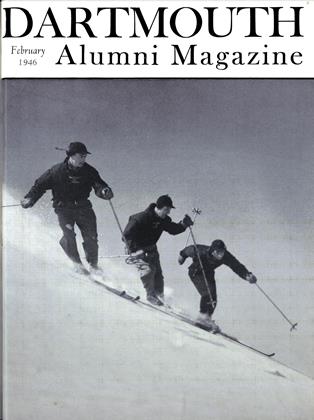ON JULY 6. 1945 there died in a hotel fire in Ontario Major Peter W. Rainier. The ironic thing about this death was that Rainer had risked his life for years all over the world as a practicing engineer, had fought in two world wars, and had explored mountains and jungles on several continents. Lest he be too soon forgotten I want to recommend at this time two of his books. One, Green Fire (Random House, 1942), tells of high adventure in the quest for emeralds and gold in the Andes of Colombia, of his fight with a bandit chief, "the most evil man I ever met," and other adventures. The book is most interesting reading, is well written, and well worth your time. The other, one of the best of World War II books, is Pipe Line toBattle (Random House, 1943), which describes the laying of a hundred miles of water-pipe to supply Montgomery's 8th Army, and other fabulous doings in that magnificent North African campaign, which with Stalingrad, marked the turning point of the war against the Axis. This was written while Peter Rainier was on active service: "Most of it was done at night in a hole in the desert covered by a piece of canvas and usually accompanied by noises which were not nice. However, despite shellfire, strafing from the air, sandstorms, deluges and constant traveling, it grew."
Lower Deck, by Lieutenant John Davies RNVR, won the award for the best work of general literature submitted for the Macmillan (London) Centenary Awards. It is an unpretentious account of how six ordinary Englishmen lived and worked together, and joked and fought, and how one of them died, as they manned a B-gun on the destroyer Skye, until she was sunk one dawn by the enemy. The action' takes place in the Mediterranean and is a true story. Recommended.
Another war book I hope you will read is Arnhem Lift (Farrar and Rinehart, 1945) by a glider pilot, Louis Hagen, which in diary form tells what happened to a parachute outfit from Monday to Monday at Arnhem. With none of the "All Quiet" undertones the author writes as objectively as if he had been an observer from Mars. The result is a magnificent description, realistically and psychologically true, of a remarkable battle, minute as it was in the general scale of fighting in the ETO. Beach Red, by Peter Bowman (Random House, 1945), is the description of an action in the South Pacific from the point of view of a man on patrol who is killed by a Jap sniper soon after he has reported back by telephone about his mission. I hope you won't let the verse form deter you from reading the book. A moving story.
I missed in 1941, when it came out, George Dibbern's Quest (W. W. Norton). In 1930 the author, getting nowhere in a depressed Germany, and being as he felt a citizen of the world, left Germany and sailed for ten years in a 38-foot "double ender," leaving his family much as Gauguin had many years before. He made his own passport: "I, George John Dibbern, through long years in different countries and sincere friendship with many people in many lands feel my place to be outside of nationality, a citizen of the world and a friend of all peoples This is why, on my own ship I fly my own flag, why I have made my own passport and so place myself without other protection under the goodwill of the world." It is, then, a sea story with a twist. His Moby Dick is himself and the book becomes a sort of spiritual autobiography which perhaps only a German could write. He sailed from Kiel to the islands of the Mediterranean via England, across the Atlantic, then to Hawaii, New Zealand, and the South Pacific. The author has just been released from a New Zealand Internment Camp and needs funds to sail again in the Te Rapunga, his ship. He gets $1.50 for every book sold and copies may be purchased for $3.10 from Henry Miller, Big Sur, California.
For all those alumni who fought in North Africa I recommend an old book by Hilaire Belloc called Esto Perpetua (first published in 1906) which will give you the background of that cursed land which will surprise most that have been there. A little classic.
 View Full Issue
View Full Issue
More From This Issue
-
 Article
ArticleAlumni Council Meets
February 1946 By SIDNEY C. HAYWARD -
 Article
ArticleThe Admissions Problem Grows With Every Mail
February 1946 By Robert C. Strong '24 -
 Class Notes
Class Notes1918
February 1946 By ERNEST H. EARLEY, DONALD L. BARR -
 Class Notes
Class Notes1917
February 1946 By MOTT D. BROWN, DONALD BROOKS -
 Article
ArticleDARTMOUTH SKI SCHOOL
February 1946 By STEPHEN J. BRADLEY '39 -
 Class Notes
Class Notes1919
February 1946 By J. KENNETH HUNTINGTON, MAX A. NORTON
HERBERT F. WEST '22
-
 Article
ArticleHanover Browsing
January 1945 By HERBERT F. WEST '22 -
 Article
ArticleHanover Browsing
March 1948 By HERBERT F. WEST '22 -
 Books
BooksALL THE BEST IN HOLLAND
November 1950 By Herbert F. West '22 -
 Article
ArticleHanover Browsing
October 1952 By HERBERT F. WEST '22 -
 Article
ArticleHanover Browsing
March 1955 By HERBERT F. WEST '22 -
 Books
BooksWILD TRAIN: The Story of the Andrews Raiders
January 1957 By HERBERT F. WEST '22
Article
-
 Article
ArticleINSURANCE PLAN OF THE CARNEGIE FOUNDATION
August 1917 -
 Article
ArticleA WAH-HOO-WAH!
November 1939 -
 Article
ArticleHopkins Center Administrator
FEBRUARY 1969 -
 Article
ArticleD-Flicks
June 1992 -
 Article
ArticleRushing Rules Revised
JANUARY, 1928 By "F. Clark S. '30." -
 Article
ArticleSun-Powered Scholar
October 1992 By Ross Nova '94


